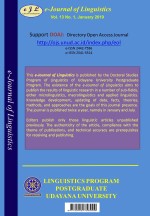The Relationship Between The Concept of Pdr and The Practice of Brown & Levinson’s Politeness Strategies by Indonesian Caregivers in The Domain of Elderly Care in Japan
Abstract
An important topic of pragmatic studies is politeness. To be able to deliver messages successfully in a speech act, politeness is believed to be an important means that can be used to reduce inconvenience in communication process. This article is a piece of research to support a dissertion that examines politeness in communicating in Japanese by Indonesian caregivers towards the elderly in Japan. Specifically, this article examines the relationship between PDR (power, distance, rank of imposition) concept and the practice of Brown&Levinson’s politeness strategies by the Indonesian caregivers towards the elderly in Japan. This study applies qualitative method. The type of data used is primary data in the forms of utterances from the Indonesian caregivers towards the elderly. The Indonesian caregivers who are the subjects of the study work at 6 elderly care homes in Japan. These six homes were chosen as research locations as they hire more Indonesian caregivers compared to other homes. The results of the analysis indicate that there is relationship between the concept of PDR and the practice of Brown&Levinson’s politeness strategies in the utterances of the caregivers towards the elderly; however, the two concepts of Brown&Levinsoncan cannot be fully applied in the utterances of the Indonesian caregivers in the context of taking care of the elderly. The Indonesian caregivers applied positive and negative politeness strategies in their utterances towards the elderly, as the choice of the politeness is highly dependent on the situational contexts where the utterances take place.
Downloads
References
Brown,P.danStephenC.Levinson. 1978.Politeness:SomeUniversalsin
LanguageUsage.Cambridge: Cambridge UniversityPress.
Kabaya, Hiroshi. et all. 2009. Keigo Hyougen. Tokyo : Taishukan.
Kaneko, H. 2014. Nihongo Keigo Toreeninggu. Tokyo : PT Ask.
Kristianto, Yohanes. 2017. Hospitality Languages in Tourism Field: Face Work. e-Journal of Linguistics Vol.11 No.1 pp: 11-29. Available from URL : http://ojs.unud.ac.id/index.php/eol.
Rai, Jaya Widanta Made. 2017. Implementation of Brown & Levinson Sociological Aspects in Verbal Interaction at Hotel Context. e-Journal of Linguistics Vol.10 No.2 pp: 165-171. Available from URL : http://ojs.unud.ac.id/index.php/eol.
Rahayu, Ely Triasih. 2013. “Sistem dan Fungsi Tingkat Tutur Bahasa Jepang dalam
Domain Perkantoran” (disertasi). Tidak Diterbitkan. Solo : UNS.
Rahayu, Ely Triasih. 2017. Konstruksi Tuturan Bahasa Jepang. Yogyakarta : Erhaka Utama.

This work is licensed under a Creative Commons Attribution 4.0 International License











